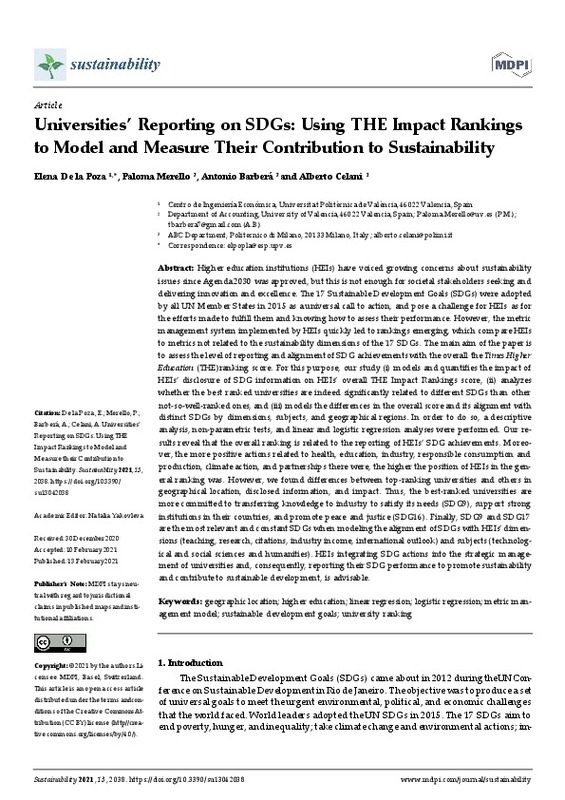JavaScript is disabled for your browser. Some features of this site may not work without it.
Buscar en RiuNet
Listar
Mi cuenta
Estadísticas
Ayuda RiuNet
Admin. UPV
Universities' Reporting on SDGs: Using THE Impact Rankings to Model and Measure Their Contribution to Sustainability
Mostrar el registro sencillo del ítem
Ficheros en el ítem
| dc.contributor.author | De la Poza, Elena
|
es_ES |
| dc.contributor.author | Merello, Paloma
|
es_ES |
| dc.contributor.author | Barberá, Antonio
|
es_ES |
| dc.contributor.author | Celani, Alberto
|
es_ES |
| dc.date.accessioned | 2022-06-01T18:07:20Z | |
| dc.date.available | 2022-06-01T18:07:20Z | |
| dc.date.issued | 2021-02 | es_ES |
| dc.identifier.uri | http://hdl.handle.net/10251/183043 | |
| dc.description.abstract | [EN] Higher education institutions (HEIs) have voiced growing concerns about sustainability issues since Agenda 2030 was approved, but this is not enough for societal stakeholders seeking and delivering innovation and excellence. The 17 Sustainable Development Goals (SDGs) were adopted by all UN Member States in 2015 as a universal call to action, and pose a challenge for HEIs as for the efforts made to fulfill them and knowing how to assess their performance. However, the metric management system implemented by HEIs quickly led to rankings emerging, which compare HEIs to metrics not related to the sustainability dimensions of the 17 SDGs. The main aim of the paper is to assess the level of reporting and alignment of SDG achievements with the overall the Times Higher Education (THE) ranking score. For this purpose, our study (i) models and quantifies the impact of HEIs' disclosure of SDG information on HEIs' overall THE Impact Rankings score, (ii) analyzes whether the best ranked universities are indeed significantly related to different SDGs than other not-so-well-ranked ones, and (iii) models the differences in the overall score and its alignment with distinct SDGs by dimensions, subjects, and geographical regions. In order to do so, a descriptive analysis, non-parametric tests, and linear and logistic regression analyses were performed. Our results reveal that the overall ranking is related to the reporting of HEIs' SDG achievements. Moreover, the more positive actions related to health, education, industry, responsible consumption and production, climate action, and partnerships there were, the higher the position of HEIs in the general ranking was. However, we found differences between top-ranking universities and others in geographical location, disclosed information, and impact. Thus, the best-ranked universities are more committed to transferring knowledge to industry to satisfy its needs (SDG9), support strong institutions in their countries, and promote peace and justice (SDG16). Finally, SDG9 and SDG17 are the most relevant and constant SDGs when modeling the alignment of SDGs with HEIs' dimensions (teaching, research, citations, industry income, international outlook) and subjects (technological and social sciences and humanities). HEIs integrating SDG actions into the strategic management of universities and, consequently, reporting their SDG performance to promote sustainability and contribute to sustainable development, is advisable. | es_ES |
| dc.language | Inglés | es_ES |
| dc.publisher | MDPI AG | es_ES |
| dc.relation.ispartof | Sustainability | es_ES |
| dc.rights | Reconocimiento (by) | es_ES |
| dc.subject | Geographic location | es_ES |
| dc.subject | Higher education | es_ES |
| dc.subject | Linear regression | es_ES |
| dc.subject | Logistic regression | es_ES |
| dc.subject | Metric management model | es_ES |
| dc.subject | Sustainable development goals | es_ES |
| dc.subject | University ranking | es_ES |
| dc.subject.classification | ECONOMIA FINANCIERA Y CONTABILIDAD | es_ES |
| dc.title | Universities' Reporting on SDGs: Using THE Impact Rankings to Model and Measure Their Contribution to Sustainability | es_ES |
| dc.type | Artículo | es_ES |
| dc.identifier.doi | 10.3390/su13042038 | es_ES |
| dc.relation.projectID | info:eu-repo/grantAgreement/COMISION DE LAS COMUNIDADES EUROPEA//2016-2717%2F001-002//PROMOTING EXCELLENCE IN TEACHING AND LEARNING IN AZERBAIJANI UNIVERSITIES./ | es_ES |
| dc.rights.accessRights | Abierto | es_ES |
| dc.contributor.affiliation | Universitat Politècnica de València. Departamento de Economía y Ciencias Sociales - Departament d'Economia i Ciències Socials | es_ES |
| dc.contributor.affiliation | Universitat Politècnica de València. Instituto Universitario de Matemática Multidisciplinar - Institut Universitari de Matemàtica Multidisciplinària | es_ES |
| dc.description.bibliographicCitation | De La Poza, E.; Merello, P.; Barberá, A.; Celani, A. (2021). Universities' Reporting on SDGs: Using THE Impact Rankings to Model and Measure Their Contribution to Sustainability. Sustainability. 13(4):1-30. https://doi.org/10.3390/su13042038 | es_ES |
| dc.description.accrualMethod | S | es_ES |
| dc.relation.publisherversion | https://doi.org/10.3390/su13042038 | es_ES |
| dc.description.upvformatpinicio | 1 | es_ES |
| dc.description.upvformatpfin | 30 | es_ES |
| dc.type.version | info:eu-repo/semantics/publishedVersion | es_ES |
| dc.description.volume | 13 | es_ES |
| dc.description.issue | 4 | es_ES |
| dc.identifier.eissn | 2071-1050 | es_ES |
| dc.relation.pasarela | S\429508 | es_ES |
| dc.contributor.funder | COMISION DE LAS COMUNIDADES EUROPEA | es_ES |
| dc.subject.ods | 04.- Garantizar una educación de calidad inclusiva y equitativa, y promover las oportunidades de aprendizaje permanente para todos | es_ES |








